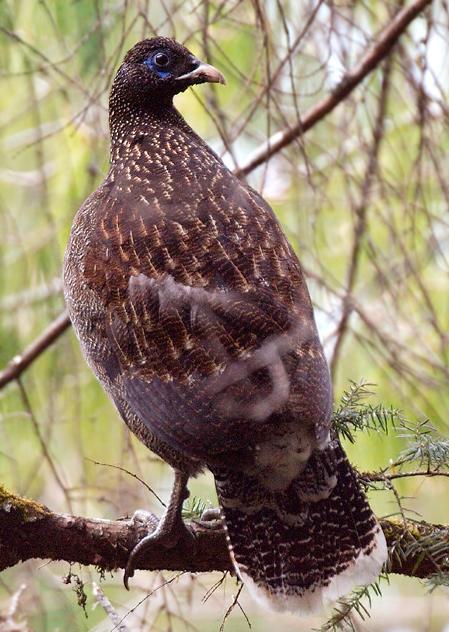|
| 질의: Large blue | 결과: 912번째/1065 | |
Sclater's Monal (Lophophorus sclateri) - Wiki
| 제목: | Sclater's Monal (Lophophorus sclateri) - Wiki
| |

| 해상도: 449x632
파일크기: 62109 Bytes
등록시간: 2007:09:08 03:19:13
|
ERROR : Server Busy(-1105)
ERROR : Server Busy(-1105)
Sclater's Monal (Lophophorus sclateri) - Wiki
Sclater's Monal
From Wikipedia, the free encyclopedia
[Photo] Sclater's Monal (Lophophorus sclateri). Female Sclater Monal shot in East Arunachal Himalayas Author: Prasad BR
Sclater's Monal, Lophophorus sclateri also known as the Crestless Monal, is a large, approximately 68cm long, monal of east Himalayas region. The male is a colorful bird. It has a highly iridescent purplish-green upperparts plumage, short and curly metallic green crown feathers, copper neck, purplish-black throat, white back, blue orbital skin, yellowish-orange bill and brown iris. The tail is white, with a broad chestnut band. The crestless female is mostly a dark brown bird with white throat, pale yellow bill and barred below.
Sclater's Monal is distributed to mountain forests of southeast China, northern Myanmar and northeast India, at altitudes of 2,500 to 4,200 metres. The males of recently discovered population of Arunachal Pradesh of India has an all white tail. The diet consists mainly of seeds and flowers. The female usually lays between three to five eggs.
The name commemorates the British zoologist Philip Lutley Sclater.
Due to ongoing habitat loss, small population size, limited range and overhunting in some areas for food and its feathers, Sclater's Monal is evaluated as Vulnerable on IUCN Red List of Threatened Species. It is listed on Appendix I of CITES.
http://en.wikipedia.org/wiki/Sclater%27s_Monal
| The text in this page is based on the copyrighted Wikipedia article shown in above URL. It is used under the GNU Free Documentation License. You may redistribute it, verbatim or modified, providing that you comply with the terms of the GFDL. |
|
댓글 |
|---|
| | 손님 |
|
Scientific Name: Lophophorus sclateri Jerdon, 1870
Common Names:
English – Sclater's Monal, Crestless Monal, Sclater's Monal Pheasant
Spanish – Faisán Monal de Sclater, Lofóforo de Sclater, Monal Coliblanco
French: Lophophore de Sclater German: Weißschwanzmonal Spanish: Monal coliblanco
Taxonomy: Lophophorus sclateri Jerdon, 1870, Mishmi Hills, north-east India. |
^o^
동물그림창고 똑똑전화 누리집
^o^
|
|
|